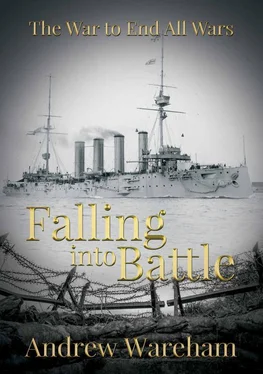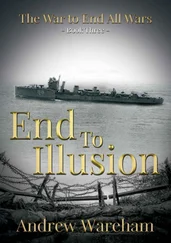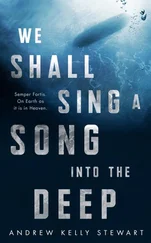“I think they may well be happy to do so, sir.”
They sailed an hour after sunset and, rather to their surprise, made it out of the harbour without a collision. Five miles offshore and Captain Smallwood ordered running lights so that the others could form up on Sheldrake .
“Bugger the regulations, Mr Dacres! Mr Sturton, to your guns, please. Mr Parrett, inspect your gun and ensure all is ready then return to the bridge.”
Five minutes and the three destroyers were confirmed to be in line astern, at one cable interval.
“Yeoman, night signal for twenty knots, course as given. Executive, then dowse running lights.”
The other captain were waiting on the pre-arranged signal and maintained station as they sped off into the night.
Dawn saw the ships off Nieuwpoort, following the shoreline to the northeast.
“Fishing boats distant one mile to port bow! Small warships on sou’westerly course inshore at eight cables.”
The lookout’s call took them by surprise – they had not really expected to find trade.
“What are they, Mr Dacres?”
“Small, sir, and not shown in the book. They appear to be converted fishing vessels, sir, led by an old torpedo-boat destroyer, three funnels. Five of them all told. The leader seems to have tubes, sir…”
Dacres returned to his telescope, useful over greater distances but difficult to focus quickly as the range varied. Simon had his own new binoculars to his eyes.
“Sturton?”
“Two tubes on the leader, sir. Three of small guns, their fifty mm quick firer, probably, sir. The four following have heavier guns, sir… something like four inch to the forecastle and twelve pounders or their equivalent, seventy-five mm, perhaps, to the stern. Maxims to the bridge, sir, or something similar. Leader is making speed, sir, building a bow wave.”
“Cox’n, steer for the leader. Yeoman, flotilla to close armed trawlers and take them if possible. Mr Harker, tubes ready. Sturton sink the torpedo-boat destroyer, open fire at your discretion. Battle ensigns.”
Simon ran to the stern, shouting at the gun captains.
“With common shell, load, load, load!”
The repetition was unnecessary at the beginning of an action when all was silent; originally meant to ensure that orders were heard under the noise of gunfire, it was now essential every time – it was the way things were done.
“Twelve pounder, point of aim, the bridge of the destroyer. Four inch, aim for the waist.”
The heavier shells of the four inch might penetrate to the engineroom; with luck, they could detonate a torpedo warhead on deck.
“Range?”
The gunlayer answered, using his simple rangefinder.
“Six thousand yards and closing, sir.”
The target was small and fast – and, fortunately, aggressive, coming in straight without zigzag.
“She is taking a line to release her torpedoes. Assume she will not vary her course and will be making twenty knots.”
The German squadron had been at the trawlers’ speed of about eight knots and the leader was still coming up to her own best, likely to be at most twenty-five knots bearing in mind her age.
“Open fire!”
Both guns responded, firing unders and not changing their aim in the expectation that the German ship would keep her line and come up to them.
The twelve pounder did better on this occasion, landing her third round on the bows and the fourth into the bridge; it had been worth the hours of practice.
“Enemy has opened fire, sir.”
Only one of the fifty mm quickfirers would bear while the small destroyer was on a course to use her torpedoes. The fire was wild, the smaller ship thrown about far more by the low swell and her own speed.
“Hit, sir!”
The four inch had landed amidships, behind the bridge, close to the second funnel. Four more shells followed, slashing close alongside or actually hitting. The splinters would be whipping across the deck and cutting down gun crews and torpedo men.
“Falling off her line, sir.”
Possibly she had sustained damage to her steering; more likely the twelve pounder had made the bridge unusable, killing her coxswain.
The range was rapidly closing, Sheldrake reaching her own full speed.
“Ensigns still flying… Aim for the waterline.”
The four inch gave its sharp crack and hit low in the hull. Another twelve pound shell exploded in front of the bridge and was followed by a series of smaller explosions and a growing fire.
“Ready use rounds blowing, sir.”
“Continue the action.”
The German ensign was still proud and high.
Range was down to four hundred yards and pointing the gun was easier over open sights with no aim off. The next explosion was followed by a cloud of steam flaring from the deck.
“Boilers, sir.”
The small destroyer fell off into the trough, lay motionless other than for an increasingly violent roll.
“She’s going, sir.”
Captain Smallwood shouted from the bridge.
“Mr Sturton, change target to trawlers… Belay that order! Cease fire.”
Simon looked towards the trawlers, saw three of them in process of surrender, ensigns dropping from their stubby masts. The fourth was on its side, its crew trying to launch a boat.
As Simon watched the destroyer nearest the fishing boats made speed towards the sinking vessel, closing within half a cable and dropping a boat.
“Curlew, sir. Tidy piece of work… Got a line across to the German’s boat and towing it out. Can’t see any men in the sea or left on deck.”
The trawler sank and boats were sent to the other three, boarding parties taking them under control.
Sheldrake closed on the sinking torpedo-boat destroyer and dropped one of her boats half a cable distant, Parrett at the tiller, as was right; midshipmen always had responsibility for the boats.
They watched critically as the oarsmen brought the cutter under the stern of the sinking ship and threw a line. Six men made their way down and to safety in the boat.
“Can you see their own boats?”
“One on fire to the fore, sir. One broken up on its davits. One set of davits empty – they might have got a boat off on the far side.”
Parrett took the cutter to the blind side of the little ship, appeared some while later with a boat in tow.
“Got his oars double-banked, sir. Must have put the survivors onto them.”
The cutter struggled across to Sheldrake where Parrett hooked on and then pulled the German boat alongside. The boat’s crew heaved the survivors across and then lifted them over the destroyer’s low side.
“Eighteen, all told, sir.”
“Good work. Bear a hand, get them to the break of the forecastle. Sick Berth Attendant is there.”
Sheldrake was a small ship and there was little room belowdecks for another eighteen men.
An hour and the flotilla was organised, the taken vessels in line and making their best speed for Harwich.
There were only two German speakers in the flotilla, linguistic skills being rare in Britain. Conversations with the wounded and the unwary gave the opinion that the trawlers were destined for harbour defence, were intended in the first instance for Knokkeheist, northeast of Zeebrugge, which was thought to have been taken overnight. The old torpedo-boat destroyer was being utilised to escort them before going off on her own business in the evening.
“Presumably to head towards Calais and drum up some trade there, gentlemen. Good thing we caught her. She could have torpedoed two troopers and shot up more in the dark hours.”
It seemed probable that had been her intention.
Further conversation with the trawlermen disclosed that they had been conscripted to naval service just two weeks before, the guns fitted in dock during the fortnight and naval gunlayers put aboard the day previously. The gun crews had received almost no training and had barely been able to load their pieces let alone aim and fire them. The lead trawler, which they had sunk, had managed to get off a round from each of her guns before all three destroyers had targeted her.
Читать дальше












